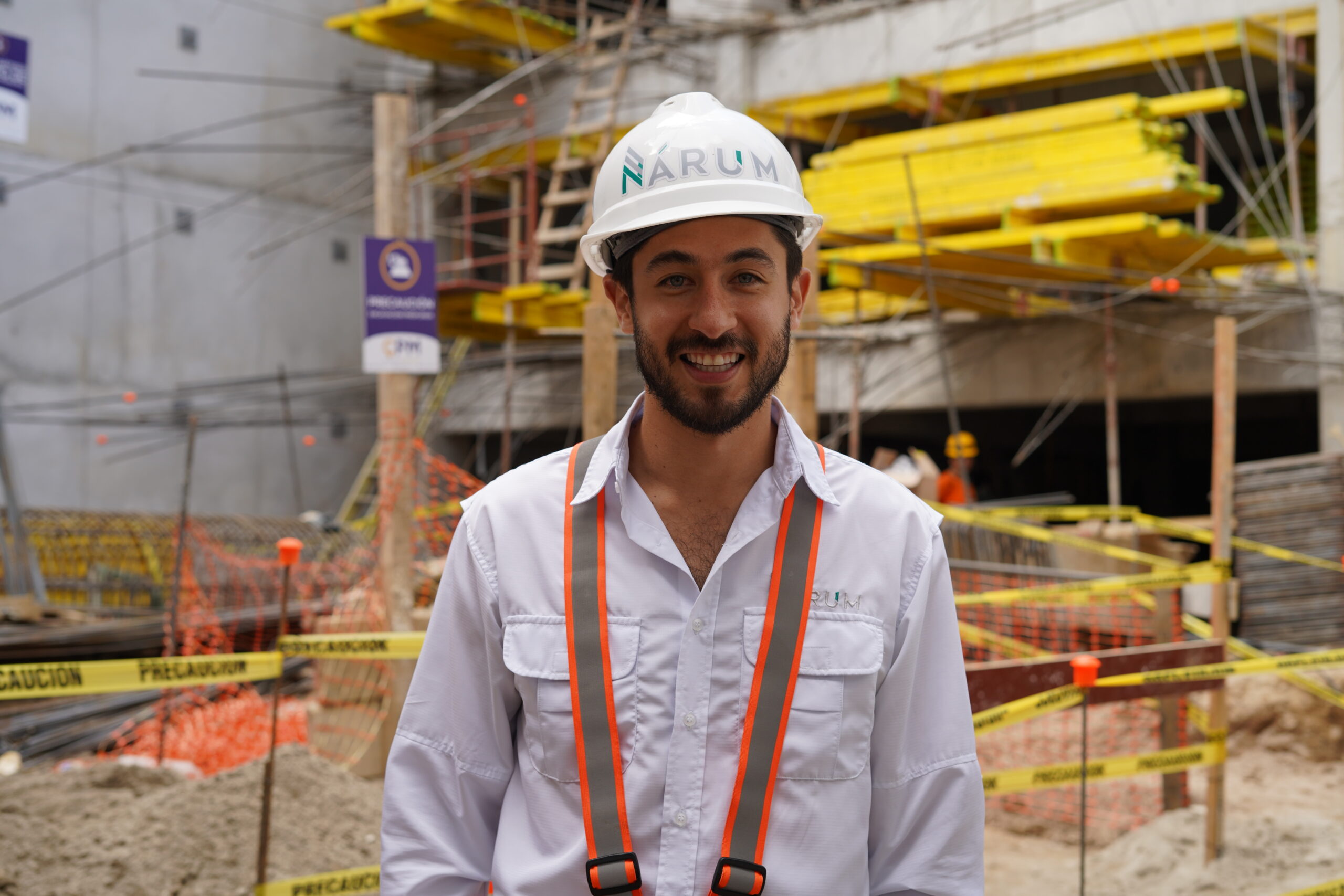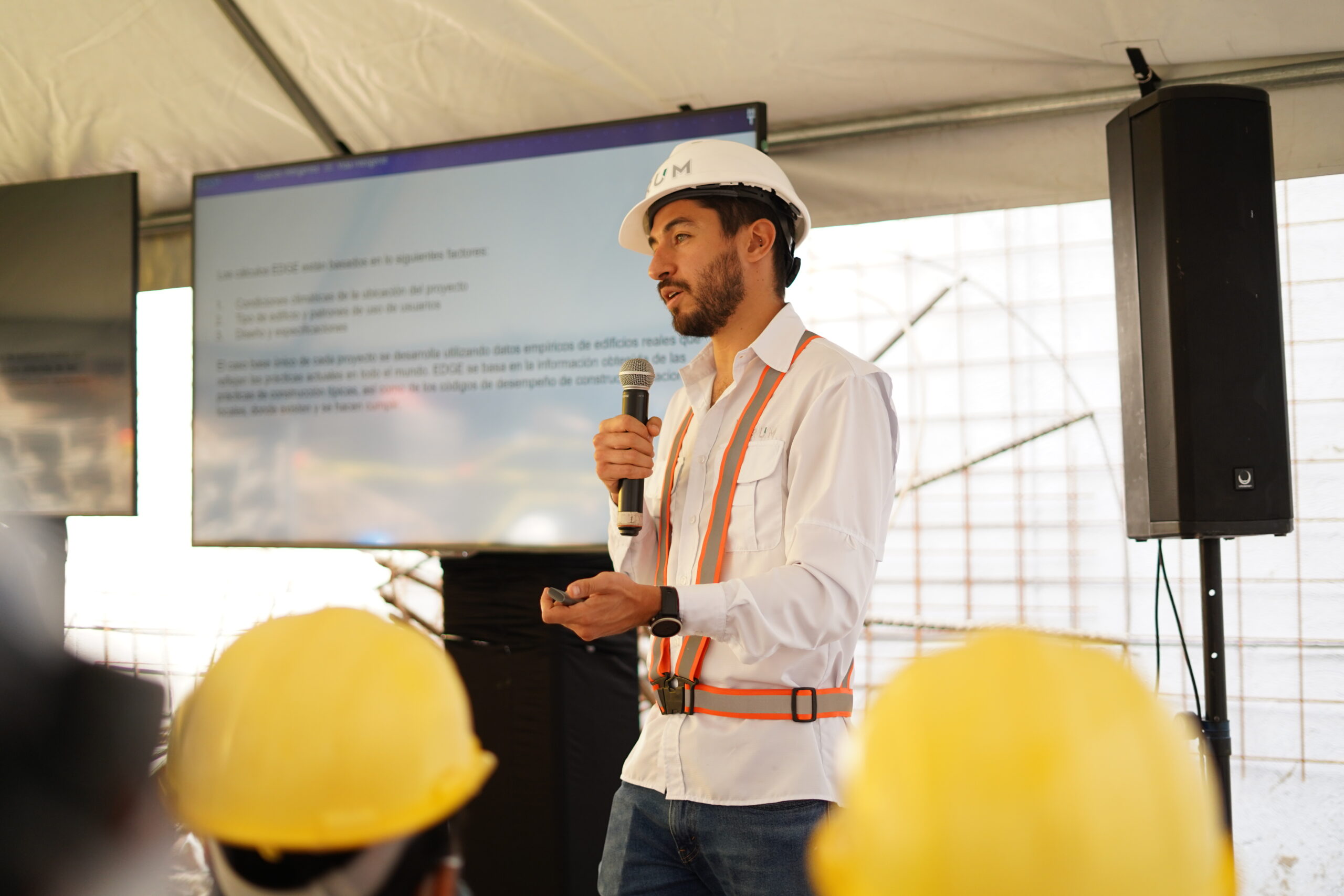
Alejandro Rivera Rivera speaks about how his Cambridge MPhil helped him co-found an award-winning company in Guatemala based on creating sustainable buildings
I wanted to get designers to think early on about alternatives to air conditioning through passive design strategies.
Alejandro Rivera Rivera
When Alejandro Rivera Rivera [2015] was doing his MPhil in Engineering for Sustainable Development at Cambridge, a key theme was dealing with complexity, change and uncertainty. The course gave him some tools to cope, but he could never have imagined how useful these would come in when he returned to Guatemala and co-founded a business based on engineering and sustainability consulting just three years before Covid hit.
Alejandro says his course gave him a new multidisciplinary perspective to problem solving and an understanding of complex systems. “Everything is connected and the fact that complex systems can be systematically tackled was eye-opening to me,” he says. He mentions in particular going to lectures given by the late Sir David MacKay on sustainable thinking. “To this day the fact that I was able to listen to him speak is incredible to me,” he says. Other highlights were talking to Dr Jonathan Cullen, a resource efficiency expert, and presenting to Arup, an engineering consultancy that he greatly admires.
Sustainable buildings
Alejandro had been working at an architectural firm before coming to Cambridge, doing sustainable consulting with green building certification. He applied to do the MPhil to update and improve his skills. He applied twice to Cambridge, but didn’t get the scholarship he needed the first time around so he tried again. He says getting a Gates Cambridge Scholarship “is still one of my proudest moments” and he greatly enjoyed the international environment he was in at Cambridge.
Alejandro’s dissertation was about eliminating and reducing office buildings’ reliance on air conditioning, based on a case study in Guatemala City. He developed a toolkit to speed up assessments which was geared towards the planning of building projects. He began with a literary review of what is meant by thermal comfort. He says air conditioning is expected in office buildings in a way it isn’t in people’s homes and that dress codes in offices correspond to assumptions about air conditioning. “I wanted to get designers to think early on about alternatives to air conditioning through passive design strategies. That began with understanding when and where the expectation of thermal comfort changed and how the air conditioning industry influenced that,” says Alejandro. It was his first real academic research project and having his work validated at that level boosted his confidence.
 Alejandro also got stuck into college life at Cambridge and was appointed sustainability officer for Clare College’s May Ball. The organising committee’s ambition was to turn it into the first carbon neutral May Ball as part of the university’s Green Impact Excellent Project. In the process Alejandro had to measure, monitor and report on the Ball’s carbon footprint. He worked to source local suppliers, reduced the Ball’s energy consumption and bought carbon offsets. Everything was documented to ensure the project left a long legacy. Alejandro says he has heard since that the work has influenced the planning of other May Balls.
Alejandro also got stuck into college life at Cambridge and was appointed sustainability officer for Clare College’s May Ball. The organising committee’s ambition was to turn it into the first carbon neutral May Ball as part of the university’s Green Impact Excellent Project. In the process Alejandro had to measure, monitor and report on the Ball’s carbon footprint. He worked to source local suppliers, reduced the Ball’s energy consumption and bought carbon offsets. Everything was documented to ensure the project left a long legacy. Alejandro says he has heard since that the work has influenced the planning of other May Balls.
Since graduating eight years ago, Alejandro has been very busy. He is now one of four partners in Grupo Capstone, a group of companies that provides services for the built environment covering the whole lifecycle of a building, from conception of a building project to design, construction and operation. There are three main companies – a real estate company, a construction company and a project management company focused on sustainability. Alejandro is CEO of one of the group’s companies, NARUM Consult, as well as leading planning, project managing and sustainability consulting for the group as a whole.
While he was at Cambridge his partners found land in the third most populated zone of Guatemala City which had previously been used for warehouse storage. The aim was to use it to build an affordable housing block – Torre Marti. On his return to Guatemala in 2016 Alejandro started work on managing the project. At the time the office could only accommodate seven people. The group now employs over 70 people. When Covid hit it had just purchased its own office space, but the group managed to battle through and, despite fears of bankruptcy, delays and rises in the price of materials due to supply chain disruption caused by the Ukraine invasion, they have survived. “It was a very stressful time,” says Alejandro.
There have also been some high points over the last few years. In 2018 Torre Marti won an award at the Latin American Real Estate Development Awards for best affordable vertical housing project in Latin America and has been celebrated for the way it addresses problems associated with rapid urbanisation in Guatemala. Alejandro says one of the most innovative things about the development is the combination of structural designs: a steel tower for parking and amenities and reinforced concrete for the apartment building. Most parking in Guatemala City for vertical projects is underground, but the decision to have two towers alongside one another connected by pedestrian bridges allowed the project to be built faster and more economically.
Despite it being in a highly populated zone, Torre Marti was the first vertical housing project in the zone, introducing the benefits of higher density in a city characterised by urban sprawl. The project draws on best practice in sustainable design, promoting access to mass transit and improving surrounding pedestrian infrastructure, employing energy- and water-saving strategies and reducing pollution from construction activities – which Alejandro had studied at Cambridge.
Green buildings
Every new project developed by Grupo Capstone has to have a green building certification. Another housing project it is currently completing is the first apartment building in Guatemala to have an Excellence in Design for Greater Efficiencies [EDGE] certificate. Alejandro was among the first people in Guatemala to obtain EDGE credentials and was a consultant on the first ever EDGE-certified project in the country back in 2020. For another housing project he worked on he used the passive design tool he developed at Cambridge to provide recommendations on glazing dimensions, thermal mass, external shading devices and natural ventilation to to reduce the need for air conditioning.
Alejandro was recently invited to be on the board of directors of the Guatemala Green Building Council, an organisation he had interned with when he did his undergraduate degree at Brown and where he got his first job referral on graduation. His company is a member of the council.
He says his time at Cambridge has also meant that he has been invited to the British embassy in Guatemala for several events and has chaired panel discussions there. He gave Sir Simon McDonald, former Permanent Under-Secretary at the Foreign and Commonwealth Office and Head of the Diplomatic Service, a walking tour of Guatemala City in 2019. “It all shows that I am still connected to and impacted by my experience in the UK,” he says. “I am especially super proud to say that I am part of the Gates Cambridge community.”












